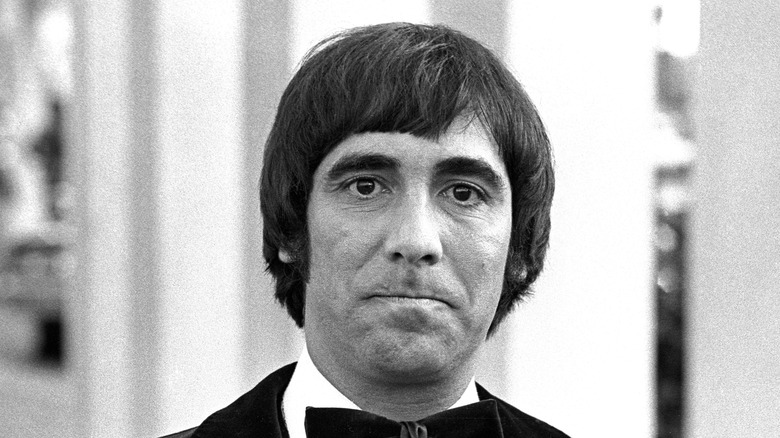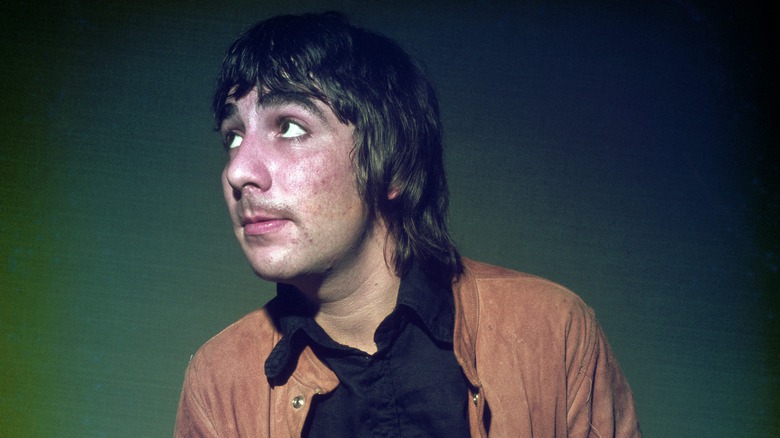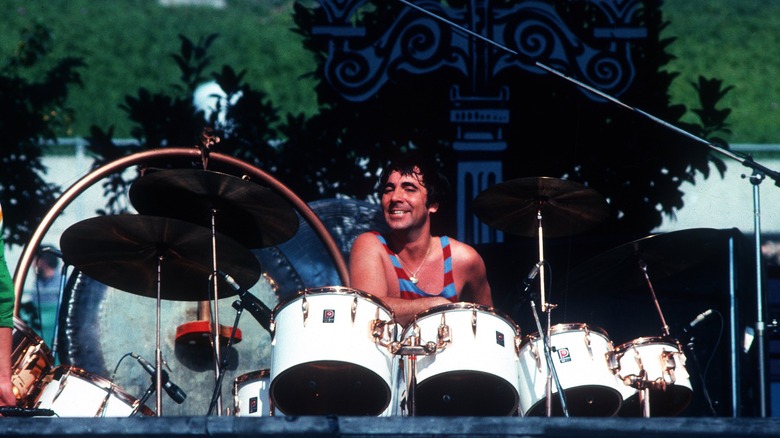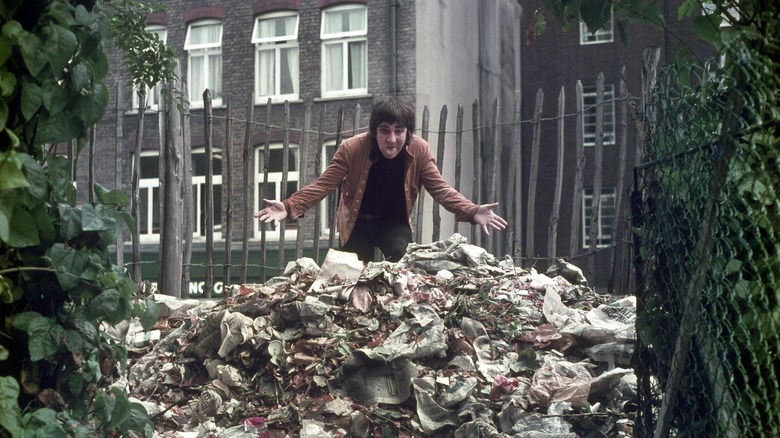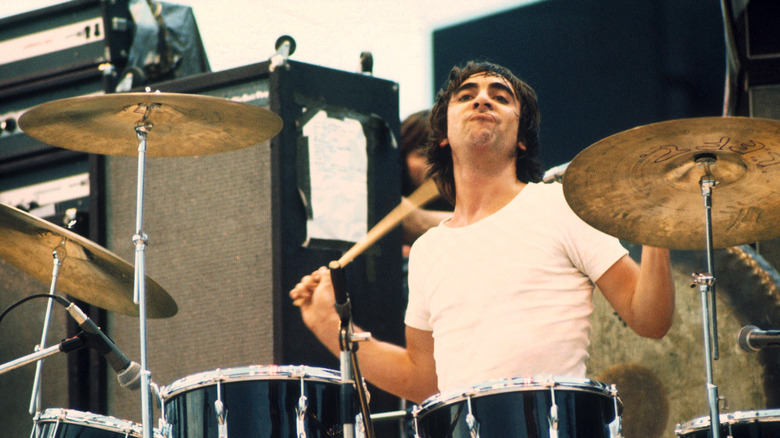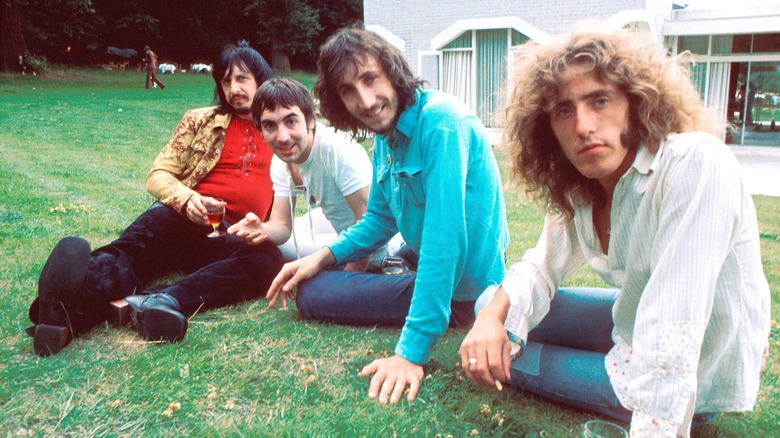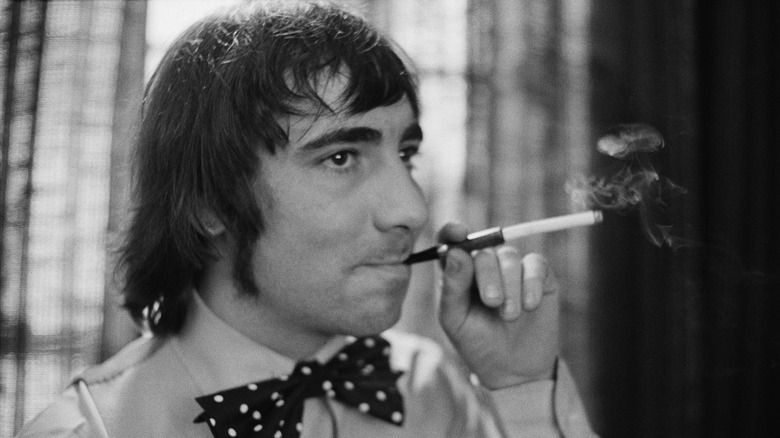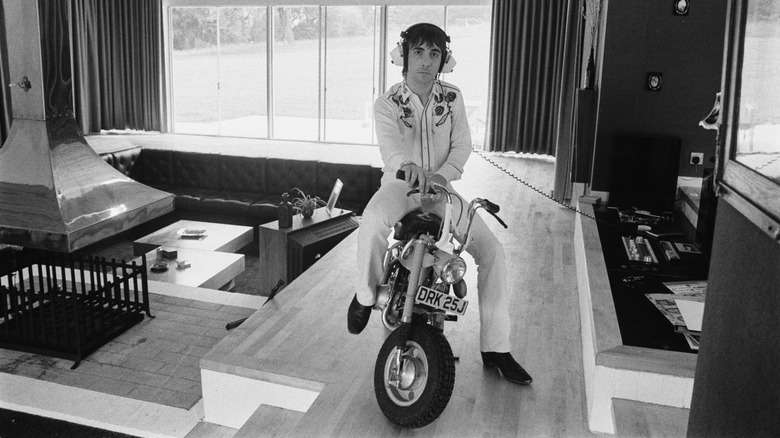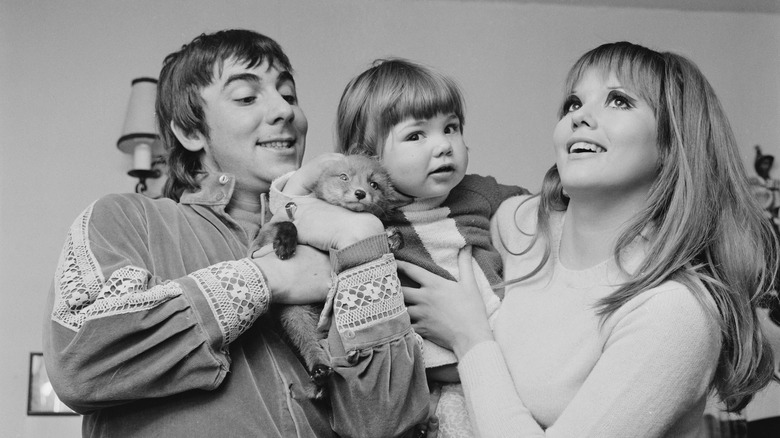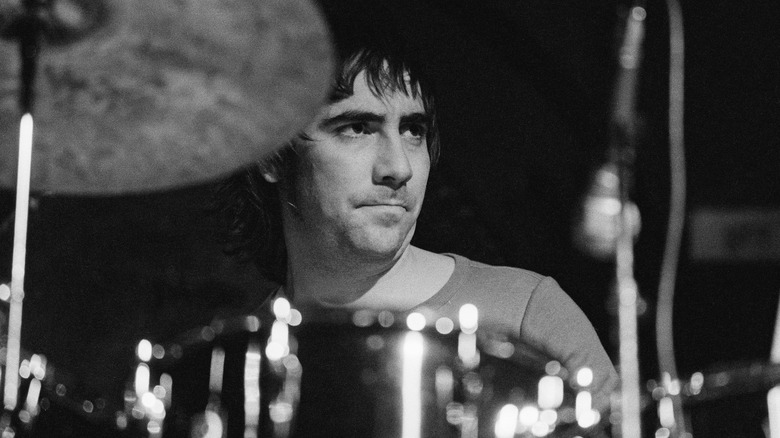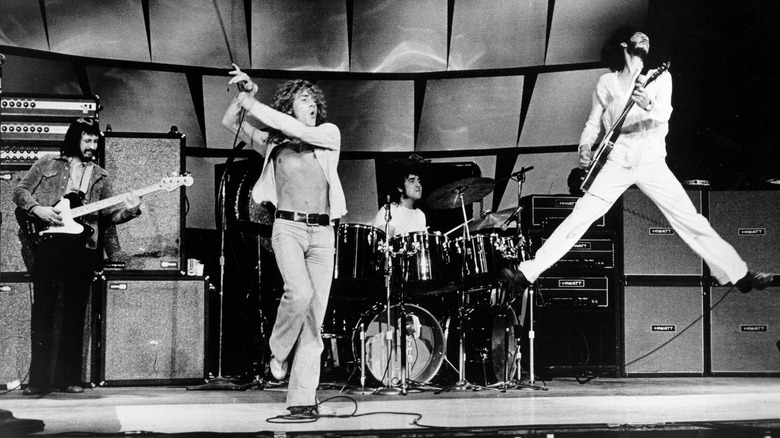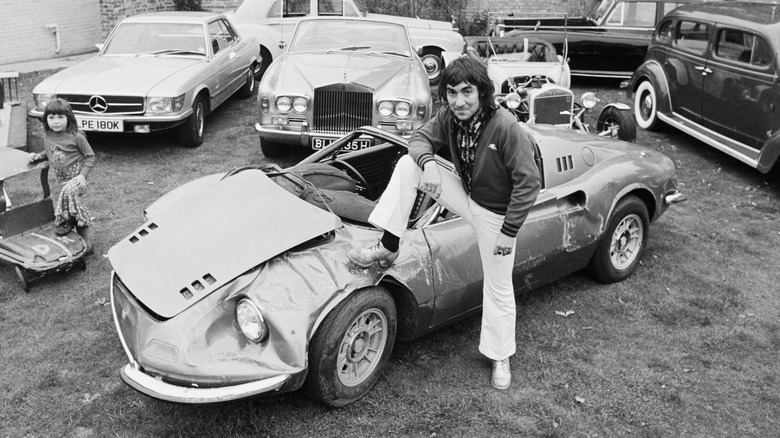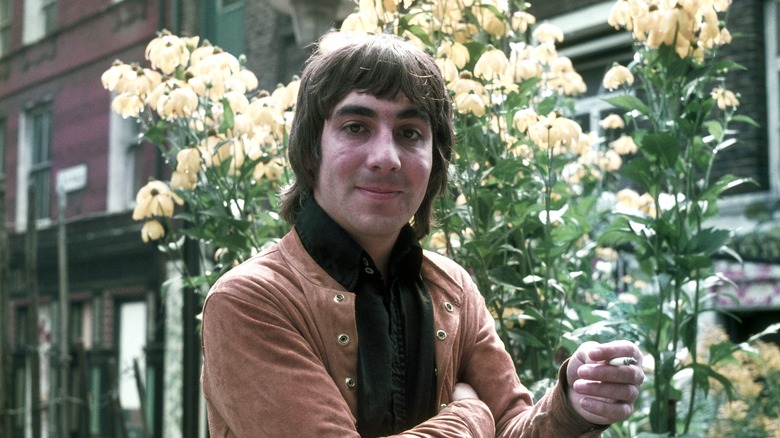Tragic Details About Keith Moon
In 1964, the British Invasion saw The Beatles, The Rolling Stones, The Kinks, and The Who take the world by storm with their loud and harsh rock 'n' roll sounds. The Who were arguably the loudest of their generation, and at their core was a formidable drummer with superhuman strength: Keith Moon. Moon's energy was a force to be reckoned with, but so were his destructive and self-destructive tendencies.
The Who were deeply inspired by the Mod subculture, as their 1964 single "Zoot Suit"/"I'm The Face" clearly shows (via "Roger Daltrey," by Stafford Hildred and Tim Ewbank). Unfortunately, this didn't just mean scooters, edgy bangs, and tailor-made suits. It also meant constant alcohol and amphetamine use — in Moon's case, this soon became an uncontrollable addiction that led to several conflicts within the band and, eventually, to his downfall. But Moon the Loon was "an exploding time bomb" (in Moon's biographer Tony Fletcher's words) long before he joined The Who, and his life was ridden with tragic moments that announced an even darker fate.
He started out on a fantasy
Keith John Moon was born in northwest London on August 23, 1946. When he joined The Who in 1964, as per The Who's official website, he was 18 years old and the youngest band member. But this wasn't enough for Moon, who already had a penchant for sensationalism. According to Tony Fletcher in "Dear Boy: The Life of Keith Moon," he declared himself one year younger, telling the band and the press that his birth year was 1947. Unfortunately, seeing how easily the lie passed as a fact, Moon took this as an incentive to construct his whole rock 'n' roll persona on a collection of lies.
Moon continuously promoted his eccentric clown drummer image through exaggerated or simply false stories about his life. The Who frontman Roger Daltrey said of Moon (via GQ), "Keith lived his entire life as a fantasy. He was the funniest man I've ever known, but he was also the saddest." Indeed, for (at least) his whole adult life, it seemed like Moon was trying to hide his real self, doing all he could to be the most eccentric person in the room. His fake birthdate only goes to show his desperation for creating an alter-ego.
Keith Moon's childhood was perfectly ordinary
As Tony Fletcher details in "Dear Boy: The Life of Keith Moon," Keith Moon's parents, Kit and Alf Moon, were a working class couple who felt very lucky to have escaped World War II. They moved to the peaceful Wembley suburb in the early 1940s (although a busy neighborhood with ever-taller buildings today, Wembley was practically countryside back then, with the exception of the famous Wembley Stadium). Keith was their first child and, according to his parents and younger sisters, their relationship was, for lack of a better word, normal.
One might argue that a complete, untraumatized family would be a dream come true for a child born after the end of World War II. But Keith's housewife mom and mechanic dad were simply too ordinary for his crazy rockstar persona. Perhaps even more sadly, Keith showed two faces as early as his primary school years: At home, he would be a quiet boy, usually crouched up next to the radio in the living room. At school, it would be a completely different story. "He was always getting in trouble, laughing and joking and farting," says Keith Cleverdon, Moon's childhood friend.
He was bullied by his teachers
Going to school in 1950's Britain was oftentimes a tough experience, as Pink Floyd's "The Wall" exemplifies perfectly. The Who's guitarist, Pete Townshend, himself described in his memoir several horrific incidents he experienced during his formative years. His ballet teacher once stripped him naked, bent him over a bathtub, and spanked him in front of a large group of giggling girls.
Moon failed his 11-plus grammar test, Tony Fletcher details in "Dear Boy," which was a huge step toward secondary education in the United Kindom at the time. He ended up in Alperton Secondary Modern, a school where physical and emotional abuse was the norm. Moon's art teacher wrote of him (via "Keith Moon: The Final 24"), "idiotic in other respects." If he couldn't please the teachers, Moon turned to entertaining the students — he became a notorious class clown.
There's yet another aspect of Moon's tragic educational experience. He showed clear signs of attention deficit disorder (ADD), yet his teachers would label his behavior a childish phase, scolding him for not growing out of it sooner. Without the proper care and treatment, Moon's distracted, hyperactive behavior spiraled. At age 14, he dropped out of school.
His best friend died in a motorbike accident
During primary school, Keith Moon became best friends with a boy from his neighborhood, Michael Morris, writes Tony Fletcher in "Dear Boy." He was part of a large family (he had nine siblings) where noise and pranks were perfectly acceptable. This made Morris his ideal companion, with the two quickly becoming partners in crime as far as scaring old ladies goes. Once, Moon and Morris hid large speakers in Moon's front garden. Whenever an old person would walk past the house, they would play the sound of an incoming train and laugh as the passers-by gasped or even screamed in terror.
Morris was Moon's best friend throughout his teenage years. But sadly, Morris died in a motorcycle accident in the late 1960s. The Who's 1965 hit, "My Generation," contains a strangely fitting verse for Moon's story: "I hope I die before I get old." Although Pete Townshend never meant it literally, Moon and his best friend did die long before they could grow old.
Keith Moon had nothing in common with his bandmates
In an interview with Rave (via "Roger Daltrey: The Biography"), Keith Moon explained his constant disagreements with his bandmates: "We really have absolutely nothing in common apart from music." British Invasion bands often spent seven days a week together, either in a studio or on tour, and it wasn't hard for tensions to pile up — think The Beatles' John Lennon and Paul McCartney, or The Kinks' Davies brothers. Similarly, Pete Townshend and Keith Moon were both strong personalities, and their relationship was rocky throughout most of their time together, Townshend implied (via Rock 101.5).
But stubbornness wasn't the main catalyst for Moon and Townshend's fights. Moon's attitude lacked seriousness or dedication. And his constant state of intoxication meant he would simply be incapable to play well. During the 1970s, Moon was regularly so high or drunk that he would pass out on stage, notes The Vintage News. During a 1973 show in San Francisco, Moon collapsed on his drum kit and was unresponsive for hours: He'd taken tranquilizers. Moon was often deeply depressed, notes Tony Fletcher in "Dear Boy," but he couldn't seem to kick his bad habits.
If you or anyone you know is struggling with addiction issues, help is available. Visit the Substance Abuse and Mental Health Services Administration website or contact SAMHSA's National Helpline at 1-800-662-HELP (4357).
At 32, he looked like he was living his last days
From the very beginning of his stardom, Keith Moon was the master of his own demise, and his bandmates were witnesses to his unavoidable downfall. Tony Fletcher in "Dear Boy" describes Moon in his last year: "Spread so far at the waist that his paunch was purposefully obstructed on the final Who album sleeve, his eyebrows having almost converged at the middle, his once beautiful face wrecked by the years of excessive drinking."
The substance abuse would also lead Moon to self-harm. As Ultimate Classic Rock details, after passing out at a gig in Boston in 1968, Moon woke up and realized what had happened. Upset, he drank some more and proceeded to destroy his hotel room (this wasn't his first). He injured himself so badly that he would have bled to death had someone not found him in time.
In August 1978, Moon gave his last interview to David Hartman on "Good Morning America" (via Louder). In it, he looks just like Fletcher's description and slurs his words as he tells Hartman he has some days here and there when he feels in control of his life. When Hartman asks him about the other days, Moon mutters, "Quite, quite out of control ... Amazingly drunk." Moon's health was declining rapidly, and his many wrinkles (way too many for a person in their early 30s) were showing it.
His downfall was predicted by his music teacher
All tragic stories become even darker if the tragedy could have been prevented. In Keith Moon's case, it was his music teacher that perfectly summed up his life in a line: "[has] great ability, but must guard against tendency to show off," as per Tony Fletcher's "Dear Boy." Indeed, Moon showed as much talent, power, and energy as he showed an uncontrollable urge to be the mad clown. During his years with The Who, he would dress up as a vicar and curse people on the street and dress a mannequin as a sex worker and have people believe he was abusing her in his luxurious car. Of course, he would also destroy several hotel rooms, toilets included (he and the band would amass thousands in damages over the years).
Moon spoke about his behavior to the media (via GQ): "When you've got money and you do the kind of things I get up to, people laugh and say that you're eccentric, which is a polite way of saying you're f*****g mad." He enjoyed the spotlight and abused the fact that, if you had enough money, people would just laugh it off, and you wouldn't face any real consequences for your actions. But he would cause tremendous pain and financial burdens to his band, and eventually, his behavior would lead to his untimely death.
He was extremely possessive towards his wife
Keith Moon met Kim Kerrigan in 1965, as per Tony Fletcher's "Dear Boy" — Moon was 19, and Kerrigan was 16. Perhaps unsurprisingly, the young lovers were very enthusiastic about each other — within a few months, Kerrigan was pregnant. The pair soon got married to give their baby daughter the right start in life. But for Moon, having a family was perhaps his greatest challenge — simultaneously, he loved Kerrigan deeply, and he wanted to party 24/7. Moon's driver and friend, Dougal Butler, wrote about their relationship (via The Independent): "There is no question at all, that [he] only ever loved one woman in his life and that woman is Kim. The only real question is whether there is anyone else he treats worse."
Moon was extremely possessive of Kerrigan, starting raging arguments over her merely talking to other men. All the while, he met with groupies. Apart from having double standards, Moon was also physically abusive toward her, often in front of baby Mandy. She recalls (via "The Final 24"): "I saw him punch her ... rip off what she was wearing." In 1973, Kerrigan left Moon and started dating musician Ian McLagan — but Moon continued to harass the couple for years, calling their home in the middle of the night and threatening McLagan. The couple got married in 1978, after Moon died.
If you or anyone you know has been a victim of sexual assault, help is available. Visit the Rape, Abuse & Incest National Network website or contact RAINN's National Helpline at 1-800-656-HOPE (4673).
He accidentally drove over and killed his bodyguard
On January 4, 1970, as UCR reports, Keith Moon and his wife attended the opening of a disco in Hertfordshire, together with Moon's driver, bodyguard, and close friend, Neil Boland. As always, Moon drank a tremendous amount of alcohol. When he ostentatiously ordered some more brandy, a gang of local skinheads became enraged with his rockstar attitude and flashy Bentley (via "The Final 24"). The violent group started attacking Moon's group, so they retreated to the car. But the skinheads surrounded the Bentley and started kicking and shaking it.
That's when Boland stepped out of the car and tried to defuse the situation. But the car was left in gear, and a severely intoxicated Moon was at the wheel. He drove it downhill to escape the gang, but Boland slipped under the car and was dragged all the way to the bottom of the road. He was pronounced dead that night. Moon was acquitted of all charges as Boland's death was ruled an accident, but his friend's death would haunt him every day until his own. According to his groupie/friend Pamela Des Barres in her memoir, he would often wake up at night and say he had no right to live.
He put The Who in debt for years after his death
Keith Moon had a notorious habit of destroying hotel rooms during his drug binges before and after shows, as Tony Fletcher details several instances in his book "Dear Boy." He would throw furniture and TV sets out the window, punch through walls, throw cherry bombs into the bathrooms, and urinate on carpet (via "The Who: I Was There," by Richard Houghton). Then he would do the same to his bandmates' rooms. And he wouldn't be any different on stage: Smashing musical equipment started as Pete Townshend's joke (via Rolling Stone). But Moon's thunder wasn't going to be stolen by Townshend, so he proceeded to make his drum kits explode at odd times, often injuring himself in the process (in 1967, he lit Townshend's hair on fire and permanently damaged his hearing). What started as a fun band signature was now painful to The Who on several levels.
In 1981, three years after Moon's death, The Who still had a £500,000 debt. Over a decade of Moon destroying hotel rooms and musical equipment (as well as damages paid to every hotel) could not be covered even by five best-selling albums. Once again, Moon's inclination to show off and maintain his mad clown persona was reckless and hurtful.
Doctors refused to help Keith Moon recover
Four years before his death, Keith Moon met his girlfriend, Annette Walter-Lax, a Swedish model, as per Rock Cellar Magazine. Walter-Lax recognized Moon's self-destructive tendencies and tried hard to help him end substance use (via "Keith Moon: The Final 24"): "He could be ... the nicest man you could ever find. But it didn't take much alcohol ... to turn him into something completely different."
Before his death, Walter-Lax tried to convince a doctor to take Moon as a patient (via "Dear Boy," by Tony Fletcher). But when the doctor visited their home, Moon's case was thus deemed hopeless, and the doctor refused to treat him. Of course it didn't help that Moon once told a doctor his
breakfast recipe often cosisted of a bottle of champagne, Courvoisier, and amphetamines. Walter-Lax described Moon at the time: "His body was so toxic that when he was going to swallow alcohol it came straight back up again. So he had to force it down. It was just awful to watch."
Walter-Lax now works as a psychotherapist and has published a book about her years with Moon (via Goldmine). She believes Moon struggled with borderline and multiple personality disorder, always "putting on an act" to escape from his real self. She regrets pinning his issues on drugs and booze and not trying harder to seek treatment for his mental issues.
If you or someone you know is struggling with mental health, please contact the Crisis Text Line by texting HOME to 741741, call the National Alliance on Mental Illness helpline at 1-800-950-NAMI (6264), or visit the National Institute of Mental Health website.
He was in recovery when he died
In 1978, the pressure was piling up on Keith Moon to get sober. As Outside Left reports, The Who had recorded their "Who Are You" album and wanted to go on tour to promote it, but Moon could barely play the drums on the album — he had trouble keeping the beat, and his nerves interfered with his drumming, with him sitting confused behind his drumkit. Pete Townshend, Roger Daltrey, and John Entwistle urged Moon to kick his substance use lest they replace him (The Who were themselves pressured by their managers to do so).
So that year, Moon decided to make a full recovery. That's when his doctor, Geoffrey Dymond, prescribed him Heminevrin (via Tony Fletcher's "Dear Boy,") a powerful drug that is used for alcohol withdrawal in patients who are under close observation. Taking more than three tablets a day can put one's life in danger, but Moon had a whole bottle at his home, and a lifelong tendency to take fistfuls of pills. On the morning of September 7, 1978, Moon took 32 tablets. He'd been at a party hosted by Paul and Linda McCartney and was upset that he'd indulged in alcohol and cocaine.
Tragically, Moon did die of a Heminevrin overdose and was pronounced dead at 5:50 p.m. Coincidentally, the apartment he and Annette Walker-Lax were renting during his recovery was the same flat where Cass Elliot (the beautiful voice behind The Mamas & the Papas) had died from a heart attack four years earlier. Both Moon and Cass were 32.
